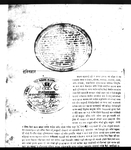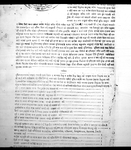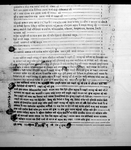An istihāra mandating that all property transactions and money loans be registered with the government (VS 1985)
ID: L_1200_0022
Edited and
translated by Rajendra Shakya
in collaboration with
Rabi Acharya
Created: 2019-01-21;
Last modified: 2020-09-10
For the metadata of the document, click here
The accompanying edition, translation/synopsis and/or commentary are available under the terms of the Creative Commons Attribution-ShareAlike 4.0 International License
Abstract
This istihāra extends the obligation for all property transactions and money loans to be registered with the government to additional regions and districts in order to discourage forgery and avoid disputes, the provision having proved successful in other areas where it had previously been enforced.Diplomatic edition
[1r-Part1]
[Seal of Candra Śamśera]इस्तिहार[Seal of Bhīma Śamśera Rāṇā]1उप्रान्तपहाडतर्फपूर्व१नम्वरइलाकाभरपश्चिम१नंब2रइलाकाभरकारपोखरा, गोरखा, बन्दीपुर, स्याङ्जा, गुल्मी,
3डोटी, दोलखा, माझकिरातमालइलाकासमेतकारैतिदुनि
4ञासन्तमहन्तभलादमीसमेतगैर्हकेएथोचितउप्रान्तआज
5अघिदुनिञादारमाजग्गाजमीनखरिदविक्रीलेनदेनभयाकोमा
6बेचनेदिनेअसामीलेवव्यहारगरेकोहोइनभन्नेरलिनेसाहुले
7फार्छ्याराजिनामालेनदेनभयाकोहोभन्नेभैसाहुअसामीको
8यस्तोकुरामाकचमचउठीनालेसउजुरसमेतपर्नेभयाकोउस्मा
9पनीयौटासाहुलाईलेखिदिशकेकोघरजग्गाअर्कोजालसाजी
10मानिसखडागरीपछीकोकागजलाईपनीअघिल्लामितिकोकृर्ते
11कागजबनाईपैहिलेकासाहुकोरुपैञापचाउनाकोमुरादलिने
12रयौटैजग्गाघर२|३ठाउँमादोहरातेहरापारीकनपनीलेखी
13दीधेरैसाहुकोरुपैञापारीरुपैञाउपरहुननशकनेगरी
14दिनऔव्यवहारगर्नेअसामीमरेपछीउस्काहकदारलेयौटा
15जग्गामा३|४जना साहुकोरुपैञापरेकोबुझिसाहुकाटंटाले
16ररुपैञातिरीजग्गासकारगर्नामाफाईदासमेतनदेखीनालेसउजुरदिदामासाहीगराइमागनेधेरैरुपैञालीनुपर्नेअसामी
17सँगदामासाहिबाटघटीरुपैञालिनपरीसाहुलाईनोक्सानीपर्नेभयाकोलेसाहुअसामीमायसविषयकोमुद्दासमेतअड्डामा
18धेरैपरेकोभैगरिपसोझादुनिञाहरूमाब्यवहारगर्नसमेतमुसकीलभएकोरआजअघीदुनिञादारकोदान-दातब्यवक्स
19धर्मपुत्रकोकागजअड्डावाटगरीपाउभन्नेहरूकोअड्डाबाटैगरीआयाकोरनेपाल४भाज्याङभित्ररमध्येशगैर्हजिल्लाऔधन
20कुटापाल्पाजिल्लामारजिष्ट्रेसनजारीगरीवक्सेमाराम्रोहिसावसँगचलेकोरकृर्तेभन्नेउजुरपर्ननशकनेदोहरातेहरापनीप्राय:
21नपर्नेभएकोहुनालेझगडाधेरैकमपरेकोकुनैकुरामाझगडापरेपनीआखिरअड्डासाछीवसीगरीदियाकोहुदाकागजकृर्ते
[1r-part2]
22नकराहुननशकनेभैदुनिञालाइसुविस्ताभयाकोवुझियाकोलेकागजगर्नालाईअड्डासम्मजानुपर्दापहिलेकेहीअसजिलोप
23रेतापनीपरिणाममाबदमासजालिमानिसलेकृर्तेजालसाजगर्नरदु:खदिननशकीदुनिञालाइसुविस्ताहवसभन्नानिमित्त
24रजिष्ट्रेसनकोनञाऐनजारीगरीबक्सीसोऐनसवैदुनिञामाथाहाहवसभन्नानिमित्तयोइस्तिहारसमेतजारी गरीवक्से
25कोछअवउप्रान्तरजिष्ट्रेसनकोकामजारीभयाकातल१दफामालेखियाकाइलाकाजिल्लाकारैतिदुनिञालेतललेखिया
26वमोजिमकागजगर्नुपर्नेभयामातपसिलमालेखियावमोजिमगर्नुअघिभैसकेकापुरानाकागजरअवगर्नुपर्नेकागजलाइ
27समेतदफादफामालेखियावमोजिमयसोयसोगर्नुपर्छभन्न्याजुनजुनइलाकाजिल्लामायोइस्तिहारजारीहुन्छसोसोठाउँ
28इलाकाजिल्लामारहेकागौंडागोस्वारालेआफनाआफनाईलाकाजिल्लामौजामौजामाकटुवालेघुमाइवाढोलपीटाईउर्दीपनी
29शुनाउनलाउनेछन्¯¯¯ ¯¯¯ ¯¯¯ ¯¯¯ ¯¯¯ ¯¯¯ ¯¯¯ ¯¯¯
30तपसिल
[table1-part1]
| दुनिञादारहरूकारजष्टरीगराउनेकामनेपाल४भाज्याङ्भित्ररमध्येशगैर्हजिल्लाऔधनकुटापाल्पाजिल्लामामात्रअ घीजारीगरीवक्सेकोमासोरजिष्ट्रेसनकोकामराम्रोहिसावसँगचलेकोबुझियाकोलेअवदेहायकाईलाकाजिल्लामापनी देहायवमोजिममालअड्डावाटरजिष्ट्रेसनगर्नेजारीगरीवक्सेकोछयोईस्तिहारजारीभयाकाइलाकाजिल्लामाघरजग्गा रहेकावालिनेपाउनेमानिसअथवादिनेमानिसरहेकाभएपनीसोमानिसलेरजिष्ट्रेसनरहेकामालअड्डामागैरजष्टरिगराउनु – | १ | ||
| पूर्व१नम्वरइलाकाभरकोसिन्धुपालचोकमालवाटगर्ने¯¯¯ ¯¯¯ ¯¯¯ ¯¯¯ ¯¯¯ ¯¯¯ ¯¯¯ ¯¯¯ | १ | ||
| पश्चिम१नम्वरइलाकाभरकोनुवाकोटमालवाटगर्ने¯¯¯ ¯¯¯ ¯¯¯ ¯¯¯ ¯¯¯ ¯¯¯ ¯¯¯ ¯¯¯ | १ | ||
| पोखरातहसिलकाइलाकाभरकोसोअड्डावाटगर्ने¯¯¯ ¯¯¯ ¯¯¯ ¯¯¯ ¯¯¯ ¯¯¯ ¯¯¯ ¯¯¯ | १ | ||
| पश्चिम२नम्वरगोरखामालइलाकाभरकोसोमालवाटगर्ने¯¯¯ ¯¯¯ ¯¯¯ ¯¯¯ ¯¯¯ ¯¯¯ ¯¯¯ ¯¯¯ | १ | ||
| पश्चिम३नम्वरबन्दिपुरमालइलाकाभरकोसोमालवाटगर्ने¯¯¯ ¯¯¯ ¯¯¯ ¯¯¯ ¯¯¯ ¯¯¯ ¯¯¯ ¯¯¯ | १ | ||
| पश्चिम४नम्वरस्याङ्जामालइलाकाभरकोसोमालवाटगर्ने¯¯¯ ¯¯¯ ¯¯¯ ¯¯¯ ¯¯¯ ¯¯¯ ¯¯¯ ¯¯¯ | १ | ||
| गुल्मीसमेत८जील्लामालइलाकाभरकोसोमालवाटगर्ने¯¯¯ ¯¯¯ ¯¯¯ ¯¯¯ ¯¯¯ ¯¯¯ ¯¯¯ ¯¯¯ | १ | ||
| वैटडीमालइलाकावाहेकडोटीमालइलाकाभरकोसोहीडोटीमालवाटगर्ने¯¯¯ ¯¯¯ ¯¯¯ ¯¯¯ ¯¯¯ ¯¯¯ ¯¯¯ ¯¯¯ | १ | ||
| पूर्व२नम्वरदोलखामालइलाकाभरकोसोमालवाटगर्ने¯¯¯ ¯¯¯ ¯¯¯ ¯¯¯ ¯¯¯ ¯¯¯ ¯¯¯ ¯¯¯ | १ | ||
| पूर्व४नम्वरमाझकीरातमालइलाकाभरकोसोमालवाटगर्ने¯¯¯ ¯¯¯ ¯¯¯ ¯¯¯ ¯¯¯ ¯¯¯ ¯¯¯ ¯¯¯ | १ | ||
[1r-Part3]
[table1-part2]
| धर्मपुत्रकोकागजरअवलअर्थात्वीर्तारैकरगैर्हजग्गाजमीन्घरकोनेपालमध्येशमा५०रुपैञारपाहाड्मा२५रुपैञादे खीमाथिकोदेहायमालेखियावमोजिमकागजपत्रगर्दागराउदारजिष्ट्रेसनअड्डामागैरजष्टरीगराउनुपर्छ¯¯¯ ¯¯¯ ¯¯¯ ¯¯¯ ¯¯¯ ¯¯¯ ¯¯¯ ¯¯¯ | २ | ||
| आफनुहकछोडीविक्रीगरिदिएकोफार्छ्यापत्र,अलिफार्छ्यापत्र,राजिनामा,सिवपुरुषनामा,वेकातापत्र,ईत्यादि कागजपत्रगर्दा¯¯¯ ¯¯¯ ¯¯¯ ¯¯¯ ¯¯¯ ¯¯¯ ¯¯¯ ¯¯¯ | १ | ||
| साहुँमाकट्टाहुनेगरीवाव्याजवापतभोगगर्नेसमेतबेहोराकोभोगवन्धकीतमसुक¯¯¯ ¯¯¯ ¯¯¯ ¯¯¯ ¯¯¯ ¯¯¯ ¯¯¯ ¯¯¯ | १ | ||
| द्रिष्टीवन्धकीतमसुक¯¯¯ ¯¯¯ ¯¯¯ ¯¯¯ ¯¯¯ ¯¯¯ ¯¯¯ ¯¯¯ | १ | ||
| भोगकोलखवन्धकीसारेकोतमसुक¯¯¯ ¯¯¯ ¯¯¯ ¯¯¯ ¯¯¯ ¯¯¯ ¯¯¯ ¯¯¯ | १ | ||
| दानदातव्यबक्सपत्र¯¯¯ ¯¯¯ ¯¯¯ ¯¯¯ ¯¯¯ ¯¯¯ ¯¯¯ ¯¯¯ | १ | ||
| सट्टापट्टा¯¯¯ ¯¯¯ ¯¯¯ ¯¯¯ ¯¯¯ ¯¯¯ ¯¯¯ ¯¯¯ | १ | ||
| अंशबण्डाकोबण्डापत्रमध्येदाखीलखारेजगर्नुपर्नेअचल्जग्गारपक्कीघरकोजतिमात्र¯¯¯ ¯¯¯ ¯¯¯ ¯¯¯ ¯¯¯ ¯¯¯ ¯¯¯ ¯¯¯ | १ | ||
| २दफावमोजिमरजष्टरीगराउनुपर्नेकागजरजिष्ट्रेसनआफिसमागैरजष्टरीगर्नुगराउनुपर्छनगरायासोलिखतवाटप्रमा णलागनरभरीभराउसमेतहुदोरहेनछभन्नेकुरासवैदुनिञालाईथाहाहवसभन्नानिमित्तयोइस्तीहारजारीगरिवक्से कोछरजिष्ट्रेसनआफिसमागैरजष्टरीगराउनुपर्नेदुनिञादारलेघरसारमालिनुदिनुगरीब्यवहारचलायाकोजुनसुकैकागज १दफामालेखियावमोजिमयोइस्तिहारजारीभयाकाजिल्लामाइस्तिहारजारीभयाकामितिदेखीअ घिकोलाइलिनेदिनेकामञ्जुरीलेअड्डामागैरजष्टरीगराउनुवारजष्टरीनगराईराखनपनीहुन्छसोरजष्टरीनगरायाका कागजवाटनालेसउजुरपर्नआयामाऐनवमोजिमनालेसउजुरशुनीइन्साफगरीदिनेछन्योइस्तिहारजारीभयाकामि तिदेखीलाइसोरजष्टरीगराउनुपर्नेकागजअड्डामागैरजष्टरीगराउनुपर्छसोवमोजिमनगरीघरसारमागरेकोभयासो लिखतबाटअड्डाअदालतलेनालेसलीपुर्पक्षगर्नरप्रमाणलगाइभरीभराउसमेतहुनेछैन¯¯¯ ¯¯¯ ¯¯¯ ¯¯¯ ¯¯¯ ¯¯¯ ¯¯¯ ¯¯¯ | ३ | ||
| २दफावमोजिमकोकागजरअरुसमेतजुनसुकैकागजपनिरजष्टरीगर्छुभनेहालैयोइस्तिहारजारीभया कामितिदेखीसोअड्डामागैरजष्टरीगर्नुपनीहुन्छ¯¯¯ ¯¯¯ ¯¯¯ ¯¯¯ ¯¯¯ ¯¯¯ ¯¯¯ ¯¯¯ | ४ | ||
| माथीदफादफामालेखियावमोजिमरजष्टरीगराउनजादालिनेदिनेदुवैथरअड्डामागैरजष्टरीगराउनुपर्छअघीगरेकोकागजमाभएअसामीभयाअसामीनैरनभयाउस्काहकदारलगीसाहुलेरजष्टरीगराउनपनीहुन्छअड्डाबाटसोवमो जिमरजष्टरीगर्नगएमायसविषयमाजारीभयाकाऐनवमोजिमकोरीतपुर्याइरजष्टरीगरीदिनेछन¯¯¯ ¯¯¯ ¯¯¯ ¯¯¯ ¯¯¯ ¯¯¯ ¯¯¯ ¯¯¯ | ५ | ||
| रजष्टरीगर्नगराउनजादायसवेहोरासँगलिन्छुभन्नेलिनेकोरदिन्छुभन्नेदिनेकोवोलिपारीदुवैथरलेदर्खास्तलेखी अड्डामादीऐनवमोजिमलागनेदस्तुरसमेतवुझाईरजष्टरीगराउनुपर्छअड्डामाजानपर्नेलीनेदिनेमानिसबेरामीभैवा इजतदारभैजाननशकेकोमाअड्डावसेकोठाउँदेखी१||कोशभन्दाटाढामाअड्डाकोमानिसजानेछैन¯¯¯ ¯¯¯ ¯¯¯ ¯¯¯ ¯¯¯ ¯¯¯ ¯¯¯ ¯¯¯ | ६ | ||
| सोकागजगर्नालाइअड्डामागैअड्डैवाटलेखीपाउभनीअड्डैवाटलेखाउनवापहिलेघरायसैमाकागजगरीसहीछापसमेत सोकागजलीकागजभयाका३५दिनभित्रअड्डामाआईरजष्टरीगराउनअथवारीतवमोजिमकोकागजघरायसमा सहीछापगराउनमात्रवाँकीराखीसोकागजलीअड्डामाआइरजष्टरीगराउनसमेतहुन्छ¯¯¯ ¯¯¯ ¯¯¯ ¯¯¯ ¯¯¯ ¯¯¯ ¯¯¯ ¯¯¯ | ७ | ||
73इतिसम्वत्१९८५सालवैसाष१गतेरोज६शुभम्¯¯¯ ¯¯¯ ¯¯¯ ¯¯¯ ¯¯¯ ¯¯¯ ¯¯¯ ¯¯¯[Seal reading Śrī Sānulāla 84][Seal reading Śrī Lakṣmīprasāda 82][Unknown seal][Unknown Seal][Seal reading Śrī Sīddhīrāja 73]
Translation
[1r-Part1]
[Seal of Candra Śamśera]
[Seal of Bhīma Śamśera]
Uprānta: To the subjects, including the saints, mahantas and bhalādamīs of the whole region of East Number 1 in the hills, the whole region of West Number 1, and also the regions [that come under the jurisdiction] of the revenue offices of Pokharā, Gorakhā, Bandīpura, Syāṅjā, Gulmī, Ḍoṭī, Dolakhā and Mājha Kirāta
Yathocita uprānta: In cases involving the purchase and sale of land or the lending and borrowing [of money] among duniyā̃dāras before today, it has happened that an asāmī who sells or gives [land in order to repay a debt] says that there has been no transaction, while the sāhu who takes [the offer] says that the quitclaim and the transfer of ownership (pharchyā rājīnāmā) have taken place, and such things engender disputes between sāhus and asāmīs, resulting in their filing complaints and petitions. On top of that, [the seller may] intend to defraud the first buyer (sāhu) of money by creating another—a fake—buyer (lit. person) and drawing up a bogus deed for the house and land sold to (lit. written in the name of) the first buyer and mentioning the same earlier date [of sale] for the later document as well, with the intention of making off with the first sāhu’s money, and [then go on to] sell the same land and house twice or even thrice to two or three persons (lit. places), resulting in the money not being able to be [re]collected, given that he has pocketed the money of many sāhus.
And in the case of the death of the seller (asāmī) who carried out the transactions, his primary beneficiary—realizing that the money of 3-4 buyers has gone into the same piece of land, and facing trouble with the buyers—seeing that there is no profit in paying [all] the money [owed to the buyers] and accepting the land [back], requests [that he be allowed to] pay the money (i.e., the going rate for the land) to the buyers proportionally. This has resulted in many cases being filed at aḍḍās over such issues between buyers and sellers, as the buyers suffer losses for having to accept less money in the form of proportional payouts from the sellers, from whom they were to have been paid more money. That in turn makes it difficult for poor, honest people to even engage in such transactions.
And as for the duniyā̃dāras who up to now have been requesting that paperwork regarding donations and charity, gifts, property transfers or child adoption be done through an aḍḍā, they are [indeed] being done by aḍḍās themselves. And as this (i.e., having the documents prepared by an aḍḍā) has been going on in a fine manner after the enactment of [obligatory] registration within the four mountain passes (bhañjyāṅga) of Nepāla (i.e., the Kathmandu Valley) and the districts in the Madhesa and the like, along with Dhanakuṭā and Pālpā districts, forgery complaints can no [longer] occur, nor does [the sale of the same property] twice or thrice occur, which has resulted in a very reduced number of disputes, or, even if there is any dispute over some issue,
[1r-Part2]
the documents cannot be forged or invalidated (nakarā), since they were prepared by and issued with an aḍḍā standing witness, and it is learnt that this has made things easy for the people.Although at the beginning there is some inconvenience on account of having to go to an aḍḍā to have the paperwork done, still it results in scoundrels being incapable of committing forgery and making trouble. [Hence we have] issued a new registration law in order to make things easy for people, and also issued this istihāra so that all people come to know about this law.
From now onwards, if subjects in the ilākās and districts mentioned in Article 1 below, where the work of registering is underway, need to prepare any [of the types of] documents mentioned below, they should do so as written in the tapasila [below].
In every ilākā and district where this istihāra is issued, instructing how things are to be done in accordance with [what is] written in each of the articles—both old documents prepared before and documents that are to be prepared from now onwards—the gauḍā and gosvārā in those ilākās and districts will send out a kaṭuvāla, or else sound a large drum (ḍhola) in their own ilākā, district or maujā, to let people hear about the order.
Details (tapasila)
[table1-part1]
| Since it has been found that [the decree] to register [the purchase and sale of property or loan deeds of] duniyā̃dāras, which was previously issued only within the four mountain passes of Nepal and the districts of the Madhesa and the like, along with Dhanakuṭā and Pālpā districts, has been proceeding in a fine manner, [we have] issued [a decree] to register in the following ilākās and districts as well, to be carried out from now onwards by the following revenue offices. Any person who owns a house or land in the ilākās or districts where this istihāra is being issued, or if any recipient or provider [of assets] is staying there, such persons shall go the revenue office where registration is conducted and have [the deeds and transactions] registered. | [Article] 1 | ||
| The [registration of documents in] the whole of East Number 1 ilākā shall be done by the Sindhupālcoka māla- - - | 1 | ||
| The [registration of documents in] the whole of West Number 1 ilākā shall be done by the Nuvākoṭamāla- - - | 1 | ||
| The [registration of documents in] the whole of Pokharā Tahasila shall be done from that (i.e., Pokharā māla] aḍḍā - - - | 1 | ||
| The [registration of documents in] the whole of West Number 2 Gorakhā mālailākā shall be done by that (i.e., Gorakhā māla) aḍḍā - - - | 1 | ||
| The [registration of documents in] the whole of West Number 3 Bandīpura mālailākā shall be done from that (i.e., Bandīpura māla) aḍḍā - - - | 1 | ||
| The [registration of documents in] the whole of West Number 4 Syāṅjā mālailākā shall be done by that (i.e., Syāṅjā māla) aḍḍā - - - | 1 | ||
| The [registration of documents in] the whole of the eight districts, including Gulmī mālailākā, shall be done by that (i.e., Gulmī māla) aḍḍās - - - | 1 | ||
| The [registration of documents in] the whole of Ḍoṭī mālailākā, except for the Baitaḍīmālailākā, shall be done by that (i.e., Ḍoṭī māla) aḍḍā - - - | 1 | ||
| The [registration of documents in] the whole of East Number 2 Dolakhā mālailākā shall be done by that (i.e., Dolakhā māla) aḍḍā - - - | 1 | ||
| The [registration of documents in] the whole of East Number 4 Mājha Kirāta mālailākā shall be done by that (i.e., Mājha Kirāta māla) aḍḍā - - - | 1 | ||
[1r-Part3]
The following documents shall be registered at the registration aḍḍā:
[table1-part2]
| In cases involving preparing deeds or getting them prepared in the manner written about above regarding the adoption of children and avvala [land], that is, land and houses on birtā, raikara etc. [land] [that are priced at] over 50 rupees in Nepal and the Madhesa, and 25 rupees in the hills - - - | [Article] 2 | ||
| In cases involving preparing deeds that relinquish one’s right [to property] after the sale [of it], such as quitclaim deeds (phārchyāpatra)s, aliphārchyāpatra1 , transfers of ownership (rājīnāmā), sivapuruṣanāmā2 , vekātāpatra3 , etc. - - - | 1 | ||
| Tamasukas [with provisions for] a usufructuary mortgage (bhogabandhakī), that is, provisions for the use [of mortgaged property] so that the capital is reduced or interest serviced - - - | 1 | ||
| Tamasukas [with provisions for] non-usufructuary mortgaged property (dṛṣṭibandhaka)- - - | 1 | ||
| Tamasukas [with provisions for] remortgaging usufructuary or non-usufructuary mortgages - - - | 1 | ||
| Deeds of gift [formalizing] donations and [acts of] charity - - - | 1 | ||
| [Deeds of] property exchange - - - | 1 | ||
| Deed of partition for the division of family property, namely land and brick houses to be acquired or renounced - - - | 1 | ||
| In accordance with Article 2, the documents that need to be registered will have to be registered by going to a registration office. This istihāra has been issued so that people will know that if [such documents are] not registered such deeds will not be valid for use as evidence [regarding] money loans or payment claims. Regarding any document that was executed upon the domestic exchange [of cash or kind] before the date this istihāra came into effect in the ilākās and districts where this istihāra has been issued, duniyā̃dāras who are required to go to a registration office and have any document registered shall go to the aḍḍā with the consent of the [other party, whether] debtor and creditor, and have the registration done in accordance with what is written in Article 1, or else one may [choose to] keep them unregistered. In the case where a complaint or petition is filed on the basis of such unregistered documents, justice shall be delivered in accordance with the law after hearing the complaint or petition. From the date this istihāra is issued onwards, such documents as need to be registered shall be registered by going to an aḍḍā and having them registered. In cases where that is not done and [the documents] are prepared domestically, an aḍḍā or adālata shall not accept and conduct hearings of petitions filed on the basis of such documents or use them as evidence regarding payments - - - | [Article] 3 | ||
| In the case where [someone] says that he wants to register a document that falls under the category the Article 2 categories or a document involving other of [such] dealings, the registration can now, from the date of issuance of this istihāra on, be done by going to the concerned aḍḍā - - - | [Article] 4 | ||
| When going to register [such documents] as outlined in each of the articles above, both debtor and creditor must go to an aḍḍā and have the registration done. In cases where the documents were prepared before [the istihāra was issued], the creditor may take the debtor himself, if he is available, or his beneficiary if he is not available, [to the aḍḍā] to have the registering done. If he goes to register [a document] accordingly, the aḍḍā shall carry out the registration, observing [thereby] the rules in accordance with the law issued in this regard - - - | [Article] 5 | ||
| When going to register [a document] or have one registered, both parties shall [each] write an application—[ones] in which the recipient affirms his act of receiving and the giver affirms his act of giving—submit [them] to the aḍḍā, pay the fee fixed according to the [registry] law and have [the document] registered. In the case where a recipient or the giver who is required to go to the aḍḍā falls sick or is someone reputed, and hence unable to go [to the aḍḍā], then no person from the aḍḍā shall go farther than 1½ kośas from where the aḍḍā is situated - - - | [Article] 6 | ||
| [Any person] may go to an aḍḍā and request that such a document be drafted and get it prepared by the aḍḍā itself, or may get it registered after previously preparing the document domestically, getting signatures [of the concerned parties] and coming to the aḍḍā with the document within 35 days of its preparation, or may draft the document domestically in accordance with the rules, with only the signatures yet to be put on, and come to the aḍḍā with the document and get it registered - - - | [Article] 7 | ||
Friday, the 1st of Vaiśākha in the [Vikrama] era year 1985 (1928 CE). Auspiciousness.
Commentary
This istihāra, issued by Prime Minister Candra Śamśera around the end of his reign, attempts to regulate property transactions and loans among commoners (duniyā̃dāra) by introducing registration requirements, as many complaints had arisen regarding people selling the same property to multiple buyers. It is clear from the document that the government had already introduced the registration process of all property transactions and loans within the four mountain passes of Nepal (the Kathmandu Valley), the Madhesa and in Dhanakuṭā and Pālpā districts. First set up by Candra Śamśera in 1910, the office was christened the Registration and Potā Aḍḍā. It was, that is, a revenue collection as well as a registration office, potā being tax collected on certain types of land. Under the revenue office (māla aḍḍā), it registered documents called tamasukas and bakasapatras (Agrawal 1976: 64). This istihāra probably follows in the wake of the Registration Aḍḍā Nayā Savāla issued in the same year.



